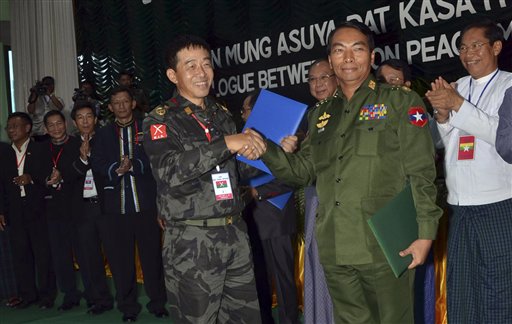The term “Nationwide Ceasefire Agreement” attracted widespread public attention after government chief peace negotiator Aung Min announced in June President Thein Sein’s intention for such an agreement to be signed in Naypyidaw by the Burmese government and all ethnic armed groups.
It is no surprise then that it became the buzzword for the Burmese government’s Union Peace-making Work Committee led by Aung Min when it met with the KIO delegation led by Sumlut Gam and Gen Gun Maw at their latest round of meetings in Kachin state capital Myitkyina beginning 8 October. A seven-point agreement was signed after three days of open- and closed-door meetings.
Despite the fact that delegations from both sides said an inclusive political dialogue is necessary for the country and will be held soon, it is apparent that there still remains a different priority and level of importance between the KIO and the Burmese government for a nationwide ceasefire agreement and political dialogue.
[related]
The KIO has once again insisted on an inclusive political dialogue to settle decades-old political issues with genuine political will from both government and ethnic nationalities. Another consistent demand from the KIO side has been a specific timeframe for political dialogue to protect itself from the familiar strategy of stagnation in Burma politics.
On the other hand, the EU-funded Myanmar Peace Center (MPC), backed by the Burmese government, issued a short opening statement that emphasises a nationwide ceasefire agreement immediately after the agreement signed between the KIO and Burmese government delegations.
The preamble of the KIO-Burmese government agreement can be directly translated as: “In order to ensure the emergence of the political agreements that guarantee lasting and sustainable peace, the two sides agreed on the following points.”
Only one point in the agreement mentions the term “nationwide ceasefire agreement”. The agreed text on that point says, “In order to begin political dialogue, the KIO is invited to participate in a nationwide ceasefire agreement.”
Vijay Nambiar, Special Adviser to the UN Secretary-General, said in a statement: “This latest round of dialogue achieved significant progress on important issues such as the establishment of a joint monitoring committee, assistance and resettlement of IDPs, the opening of additional roads and highways, and consultations with the local communities as key components of the peace process. Most importantly, the parties committed themselves to further de-escalation of violence and to moving the peace process forward speedily towards a Nationwide Ceasefire Accord.”
While many Kachin observers view the latest agreements as taking necessary steps towards beginning a national dialogue, they, like many other ethnic leaders and observers, ask why such a Nationwide Ceasefire Agreement signing ceremony is necessary when nothing has really changed on the ground.
Some observers are wary of the government’s offer of a nationwide ceasefire agreement and see it as a ceasefire just for the sake of a ceasefire, and as another of the government’s containment strategies. They see the government’s proposed step for signing a nationwide ceasefire accord as a self-imposed barrier to reach the next stage in the political dialogue and to take political advantage out of the signing ceremony.
An outcome of the meetings is a mutually agreed upon ethnic armed groups’ conference mainly focusing on the nationwide ceasefire accord to be held at the end of October in Laiza. Asked to comment on the KIO-Burmese government agreement, Bertil Lintner, a veteran writer and journalist who has written extensively about Kachin and other ethnic nationalities, said, “It is hard to see this as progress… just more of the same. And I do not believe that the government [Aung Min and the MPC] have any mandate to negotiate anything but a ceasefire deal – and to offer business concessions to the ethnic groups.”
Local residents are hopeful that current meetings and agreements between the government and KIO will bring about lasting peace. One Kachin IDP in a KIO-controlled area said he expects a lasting solution this time. “We are going through the biggest civil war in Kachin history. The number of displaced persons is the highest since our struggle began 1961. They are still living in poor conditions in crowded camps. This is the darkest time for us. After long dark nights, we want to see daylight come,” said the IDP.
Lahpai Seng Raw, who was recently awarded the 2013 Magsaysay Award for humanitarian work in Burma, said, “The situation is still very fluid – many important issues remain. This time these issues have to be faced up to and addressed.”
She added: “In 1947, being independent from the British was the overriding consideration for ethnic nationalities with the hope that they could settle the different matters among themselves after independence. Now, whether or not to participate in a nationwide ceasefire agreement is not that important. The crucial steps are to set specific commitments for an inclusive political dialogue and a specific timeframe. Legitimisation of any agreement coming out of the political dialogue is crucial. Because of our troubled past, it is difficult to have naïve optimism now. The process has just begun, and it is a long way to go, but this time political grievances have to be faced up to and addressed. It is important for all citizens to be involved in this process. The role and participation of civil societies are necessary.”
A more effective means to enforce the agreements is essentially to de-escalate tensions and cease hostilities. As the KIO demanded earlier, international involvement in monitoring mechanisms is vital to further de-escalate fighting and move towards an inclusive political dialogue without any preconditions. Strengthening enforcement is crucial to the success of the current agreements so that both sides uphold all the terms and conditions of the seven-point accord in order to move towards the next stage, whether it be signing a nationwide ceasefire or beginning a free and fair political dialogue.
Brang Hkangda is an editor of Kachinland News’s English Website.



